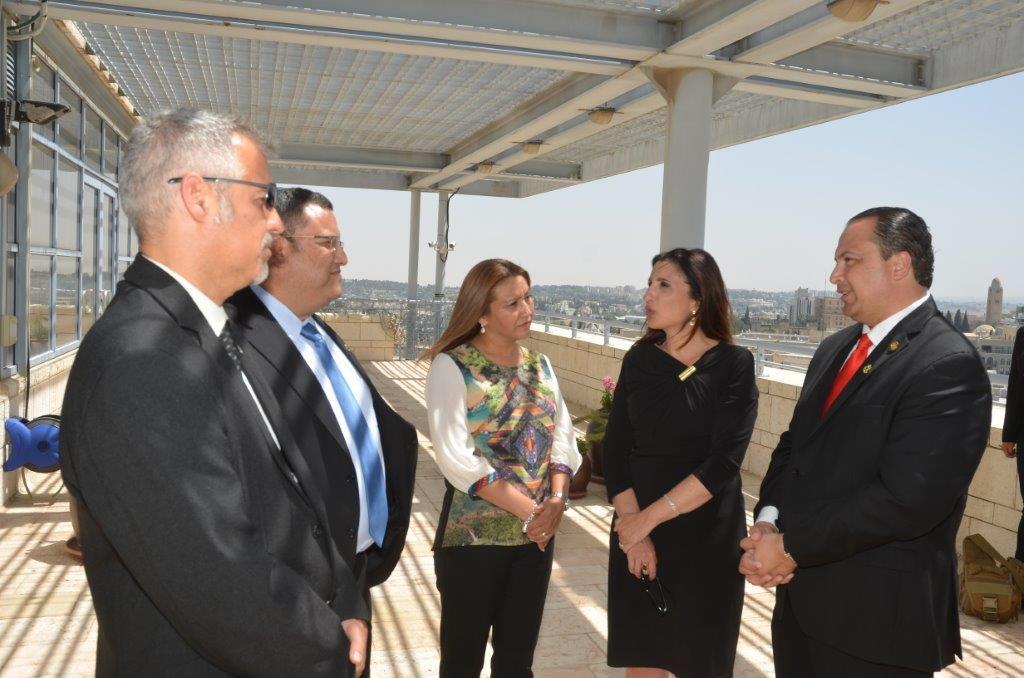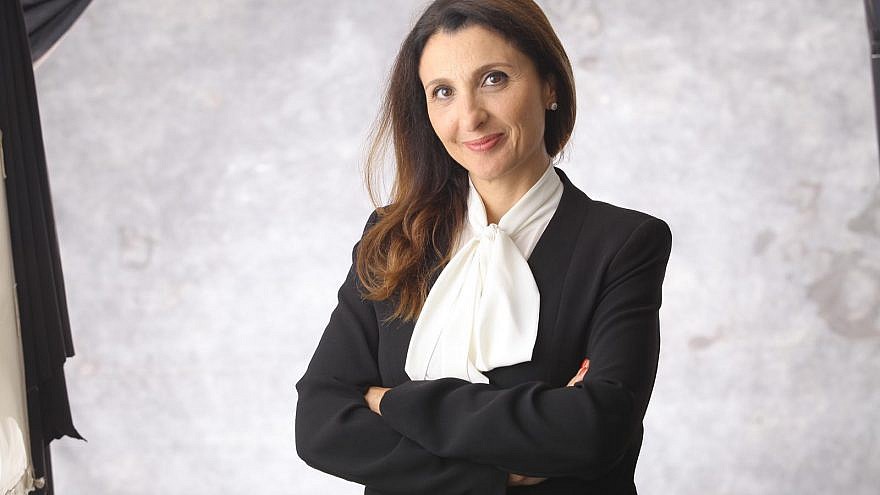Fleur Hassan-Nahoum’s story begins with her upbringing in Gibraltar as the daughter of Sir Joshua Abraham Hassan, the first mayor and chief minister of Gibraltar. It eventually wound its way to her becoming the deputy mayor of Jerusalem in 2018.
Holding the “foreign-ministry portfolio” in the city government and as the only native Spanish speaker in the municipality (she also speaks English and Hebrew), Hassan-Nahoum, a mother of four, represents Israel’s multicultural strengths and increases the city’s outreach potential.
From this perspective, her vision for the city reflects Israel’s self-determination, economic potential and responsibility to the Jewish Diaspora, while advocating for the education and financial well-being of the city’s minorities.
Hassan-Nahoum studied law at King’s College, London. She qualified as a barrister in 1997 and practiced in London before becoming the campaign director of World Jewish Relief.
She made “aliyah” with her husband in 2001 and was recruited by the American Jewish Joint Distribution Committee, and later, by Tikva Children’s Home, to establish an International Relations Department based in Israel. She also founded Message Experts, using her experience as a presenter, barrister and fundraiser to help organizations and individuals reach their goals through effective communication.
Q: What do you see as the biggest challenge facing Jerusalem?
A: Although the government puts decent investment into Jerusalem, it is the poorest city in the country. Our biggest challenge is our low workforce participation—49 percent of haredi men and 20 percent of Arab women work, and we can’t afford to have half of two of major populations not working.
At the same time, we need to create a bridge between opportunity and disenfranchised communities, which will eventually bring the city up. Jerusalem is the beating soul of the whole country; we shouldn’t be the poorest city.
The question is whether evolution will come before economic collapse, and I am optimistic.
Q: What is the municipality doing to improve education in eastern Jerusalem?
A: We have a big problem in East Jerusalem that former Israeli governments didn’t want to face. Only 14 percent of East Jerusalemite students are learning the Israeli-Arab curriculum; 10,000 are in private schools, and the remaining use the Palestinian UNRWA/Palestinian Authority curriculum, which are one and the same.
I want to make sure the kids in my city are afforded the best education.
There are a few problems with this curriculum—namely, it doesn’t teach the students Hebrew or English; the dropout rate is astoundingly high; and the curriculum is deliberately holding them back, as the policy of the Palestinian Authority leadership intends to maintain their power by keeping youth poor and uneducated. Their education has a lot of incitement against Jews, even in their math textbooks. How can we expect a future of coexistence with Palestinians when they are feeding their kids hatred and sabotaging coexistence?
These kids are my responsibility, too. So I want to make sure the kids in my city are afforded the best education, and we are making headway. More and more students in East Jerusalem are going into Israeli-Arab curriculums because more parents want opportunities for their kids, to develop economically and as a people.
We need to figure out how to live in a shared society. What does Shabbat look like with everyone living in the same space? How can we get traditional societies into the startup nation and in path of economic opportunity? Those questions will only be answered in the city.
Q: What can international organizations and actors like the United Nations do to improve the city and country as a whole?
A: The United Nations can get out of my city. It doesn’t bring anything for the people it’s purporting to help. It perpetuates victimhood, violence and hatred. We have the right to determine our capital; peace deals have always been built on the basis of Jerusalem as the capital of Israel and the Jewish people.
Q: When making decisions in the capital of the Jewish state (and therefore, the capital of the Jewish people), what is your responsibility to Jews in the Diaspora?
A: I feel that I am one of the only people in the municipality who gets that we have a responsibility to Jews in the Diaspora. I understand the sensitivities and what it’s like to live as a Jewish minority with its difficulties and dilemmas.
Others in the municipality were raised in a bubble, thinking that only those who look and talk like them are welcome. We can’t afford to be tribal after we finally have our country after 2,000 years. I am a pluralist and believe that everyone who wants to strengthen the Jewish people is welcome in the Jewish tent. Diversity is part of the beauty of the Jewish people, and I am proud that we have so many different types of people, languages and cultures, but at the same time, we share the same heritage.
The United Nations can get out of my city. It only perpetuates victimhood, violence and hatred.
The Diaspora has helped us create and build the country, and now they need us. The new generation of Americans doesn’t feel connected to Israel, and there are a lot of efforts and resources to create identity, like Birthright, Masa and Mosaic, which create a continuum of Jewish experience. But we don’t know whether they are working, and that’s the most frustrating thing.
Kids are turning against us, and many are just confused. When Jewish students get to university these days, they are given a stark choice—be pro-human rights or pro-Israel, but you can’t be both. It’s OK to criticize Israel; there are a lot of things we need to fix. We must fight discrimination, give opportunities to everybody and develop the economy with more egalitarian infrastructure. But criticize Israel to strengthen it, not weaken it. At home, my kids fight, but outside, if one of them is picked on, the others come to their side. We fight indoors; we don’t fight outside. Say, “this is my family, I love my family, and we can do better.” Come from a place to strengthen your family and be proud of who you are.
Q: What is the role of immigrants to Israel (like yourself) in Jerusalem, and how can they succeed here?
A: I believe that immigrants have a special role to play in Israel, to be that bridge to the Diaspora and to fuse Israel with the richness of the diversity of our people. I would encourage immigrants who are interested in being leaders to take part in the political process. To not let culture and language hold them back, not to be intimidated by the system. If they rise to the occasion, they can have significant voice. I would love to see more olim in high office; it is something Israel could benefit from.

Q: Many aspects of your background and upbringing make you unique, from your Gibraltarian upbringing to being a native Spanish speaker and living in London. How has such multiculturalism affected your work and the path to where you are now?
A: I am happy that I got to grow up bilingual—not just in language, but in outlook and culture. I grew up in Gibraltar, lived in England for nine years, and my mother is from Morocco. My husband is English-Sephardi; his family is from Iraq and then India. I can respect Arab culture, speak like an Andalusian and think like a Latin person, British person and a Sephardi Jew. I can connect with Spanish speakers and Anglos on many levels, where they feel they have someone who understands them. This has given me the advantage of being able to adapt to different situations.
This mixture of backgrounds and customs represents the uniqueness that the Jewish people have. Because it is made up of immigrants, Israel also has this multicultural background.
Q: In a region where few women hold high leadership positions, how has gender impacted your work? What advice can you give to young women who look up to you as a role model?
A: There are women who feel that being female is a challenge in their leadership, but I view it as a strength; that’s how my mom raised me. I never felt that I couldn’t do anything I didn’t want to do because I am a woman. Living in the Middle East, it is still a man’s world, and some women feel you have to be man-like to succeed. I believe we don’t need women acting like men; we have enough men already! But I believe women have unique qualities and skill sets infused with emotional intelligence, empathy and the ability to dedicate ourselves to a higher cause, and so women leaders have to embody the qualities that make us women.
Women in politics should mentor and strengthen female leaders until 51 percent of the population is making 51 percent of the decisions. When we have a 50-50 parliament, I believe that political decisions will be better, as diversity in general makes better decisions.
Q: Whom do you admire as a leader, and how has he or she impacted your work today?
A: My father was my main influence growing up. He was a charismatic, moderate, modest and kind man people loved. He treated everybody with respect and truly believed that we are all equal.
My father brought self-determination to the people of Gibraltar, starting as a small pressure group that turned into a parliament, eventually managing to form Gibraltar from a colony to self-determination for the Gibraltarian people to decide their own destiny.
What made him a very smart politician is that he played a very good balancing act between requesting more autonomous rights from the British, while at the same time not losing their patronage, so they could face the Spanish.
The world isn’t black and white. I believe that nuance works when you take the time to speak with people.
Here in Jerusalem, part of my job is to keep fighting for global recognition that Jerusalem is the Jewish people’s capital city, over which we have self-determination—a city we built and to which we undoubtedly have a historical connection. And at the same time, I believe in the self-determination of all peoples. I believe that the Palestinians deserve autonomy, and this is what the Oslo Accords gave them. Unfortunately, their leaders, instead of doing something positive with that autonomy, have used it as a platform for more terrorism because they have a problem with [Jewish] self-determination and autonomy.
Q: As a communications expert, how do you think Israel can improve its PR internationally?
A: The main issue with Israeli public relations and diplomacy is that we talk in terms of “they are wrong, we are right.” But the world isn’t black and white. I believe that nuance works when you take the time to speak with people. When I have admitted Israel’s faults while also criticizing other leaderships where it is due, I’ve been able to neutralize people who are not exactly on our side. For example, I acknowledge that Israel abandoned East Jerusalem, but in the last two years, we have been taking responsibility; at the same time, the Palestinian leadership there is problematic. It’s OK to let your guard down a little bit.
Q: What do you want to be remembered for in your current role?
A: I want Jerusalem to take its rightful place as a world-class city, to become the model for the solution for many challenges that we have in the country and in the world. And I want to take part in that. Our diversity gives us an opportunity to create models of shared society.


























